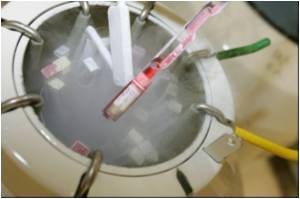An increasing number of women are choosing to freeze their eggs for social reasons in the hope they will be able to have a child when they are older.

One company, Fertility Australia, has a controversial advertisement that encourages women to 'plan your family by overriding your biological clock'.
Most companies offering the service - which typically costs more than 10,000 dollars - are choosing not to promote it. Some do not even mention its availability on their websites.
Three years ago no IVF clinic in Sydney was willing to freeze eggs for non-medical reasons, and women travelled interstate for the procedure.
But the same doctors who once said the procedure were too experimental to justify offering it now say they can no longer justify not offering it.
Fertility Australia, a fledgling advisory service with links to small IVF clinics in Sydney, Canberra and Perth, is urging women aged 25 to 35 to freeze their eggs as insurance against the risk of not finding a partner before their fertility plunges.
Advertisement
But the advertisement has alarmed other fertility specialists, who said it gave a misleading picture about an experimental procedure.
"We've never seen it as something we want to advertise or promote, because we're concerned about the limitations and the possibility of giving women false hope," said Dr Illingworth, who is also the president of the Fertility Society of Australia.
"There's nothing worse than a woman freezing her eggs at 33, thinks she's solved it, then meets a man at 35 and the eggs don't work," he added.
Sydney IVF's medical director, Mark Bowman, said his clinic had started offering egg freezing for social purposes after noting an increase in the number of successful cases overseas through a snap-freezing technology called vitrification.
The clinic cites a 2008 Spanish study of 57 volunteers, which found that 73 percent of thawed eggs were fertilised and 63 percent of patients became pregnant.
"One of the things that's very easy to do is promote panic among women in their 30s about reproduction," said Dr Bowman.
"If you're in a relationship in your late 30s, don't spend another few years trying to pay the mortgage off [but] we have to be very careful not to drive that as a message promoting a clinical service. I think it's insensitive to make that an outright advertisement," he added.
Source-ANI









